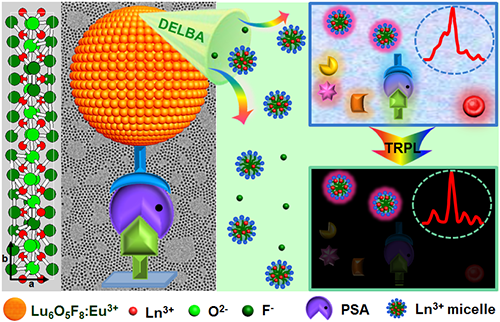Prostate cancer (PCa) is the third most common cancer in men worldwide. Prostate specific antigen (PSA) has been commonly used as a tumour marker for the early diagnosis of PCa and monitoring of PCa relapse after radical prostatectomy. The PSA level in the serum of cancer patients usually decreases to ~1 pg/mL after radical prostatectomy, and a serial increase in the PSA level indicates the recurrence or metastasis of PCa. Thus, ultrasensitive detection of PSA is crucial for the theranostics of PCa. However, commercial fluorescence bioassays have detection limits around 0.1 ng/mL, which are insufficient for the monitoring of PCa relapse after radical prostatectomy.
To overcome this concern, the research group led by Prof. CHEN Xueyuan and HUANG Mingdong at Fujian Institute of Research on the Structure of Matter (FJIRSM), Chinese Academy of Sciences, have recently developed sub-5 nm lanthanide-doped lutetium oxyfluoride nanoprobes for ultrasensitive detection of PSA. Benefiting from the high molar density of lanthanide ion in oxyfluoride matrix and superior dissolution capability in the enhancer solution (i.e. the solution of triton X-100 micelle containing 2-naphthoyltrifluoroacetone(β-NTA)A) and tri-n-octylphosphine oxide (TOPO) chelating ligands in the inner cavity).
They demonstrated the successful use of sub-5 nm Lu6O5F8:Eu3+ nanoprobes for the assay of PSA in patient serum samples with a limit of detection down to 0.52 pg/mL (15.2 fM), which is almost 200-fold improvement relative to that of commercial dissociation-enhanced lanthanide fluoroimmunoassay (DELFIA) kit, and is the lowest among lanthanide nanoprobes ever reported for the luminescent bioassay of PSA.
More importantly, they have successfully employed the ultrasmall nanoprobes for the detection of PSA in 23 clinical serum samples of patients suffering from PCa, which were kindly provided by Fujian Provincial Cancer Hospital, Fuzhou, China, and the assay results were highly consistent with those measured independently by DELFIA kit. Also, experiment for detecting the response of Lu6O5F8:Eu3+ nanoprobes towards the potential interfering proteins coexisting in serum samples has been conducted, the results of which confirmed the specificity of their proposed method for the detection of PSA in complex human serum samples.
Further indicators such as the coefficient of variations (in the range of 0.2–8.5%) and the recoveries (in the range of 92-108%) of the assays revealed the excellent accuracy and precision of the proposed bioassays for PSA. Results of this study have been published as an edge article in Chemical Science, published by the Royal Society of Chemistry (Chem. Sci.2016,7, 2572-2578,DOI: 10.1039/C5SC04599A).
Previously, Prof. CHEN and HUANG’s groups had made a series of relevant progress on the in vitro biodetection of tumor markers based on lanthanide-doped luminescent nanoprobes (Chem. Soc. Rev.2015,44, 1379-1415,DOI: 10.1039/C4CS00178H,Inside Front Cover; Nanoscale,2015, 7, 4274-4290, DOI:10.1039/C4NR05697C,Cover). For instance, they had developed a unique and ultrasensitive bioassay method, i.e. dissolution-enhanced luminescent bioassay (DELBA), and demonstrated the ultrasensitive and accurate detection of an important tumor marker CEA in human serum samples (Angew. Chem. Int. Ed.2014, 53, 12498-12502, DOI: 10.1002/anie.201405937).
Article Link: http://pubs.rsc.org/en/Content/ArticleLanding/2016/SC/C5SC04599A

Schematic illustration of PSA detection utilizing ultrasmall lanthanide-doped Lu6O5F8 nanoprobes. (Image by Prof. CHEN Xueyuan's group)